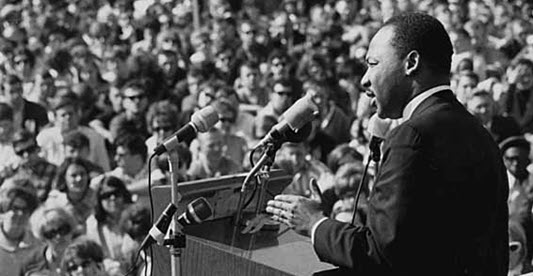Today, Dr. Kings Words Ring True: "Nonviolence or Nonexistence"
Posted February 23, 2018 11:20 pm | Op-Ed

Sixty-one years ago Dr. Martin Luther King declared, "Today the choice is no longer between violence and nonviolence. It is either nonviolence or nonexistence." Emboldened by the success of the Montgomery Bus Boycott two years earlier, King saw nonviolence not only as a powerful strategy for achieving social change, but as a philosophy and way of life that gave the world its only genuine alternative to the doomsday scenarios posed by the cold war arms race. He said, "In a day when Sputniks and Explorers dash through outer space and guided ballistic missiles are carving highways of death through the stratosphere, nobody can win a war."
Today, efforts to control nuclear proliferation appear to be unraveling or failing. As countries like the U.S. and Russia are engaging in a newly intensified arms race, Dr. King's words carry new urgency.
There is another reason for urgency: climate change.
Recent scientific reports, including a report issued this past October by the UN's Intergovernmental Panel on Climate Change, predict that at the present rate of fossil fuel consumption the earth will warm up by as much as 2.7 degrees Fahrenheit by 2040, decades earlier than previously predicted. Major coastal flooding, intense droughts, and increased levels of poverty around the world will likely occur within the lifetimes of many people living today.
These developments carry profound implications for human society – and for the issues of war and peace. Many researchers and policy makers acknowledge climate change as a major driver of human migration. Increasing numbers of people, displaced by flooding, decreasing crop productivity, and water shortages will be forced to leave their homes in search of habitable spaces and livelihoods.
The World Bank issued a report last March predicting that as many as 150 million people in Sub-Saharan Africa, Latin America, and South Asia could be displaced within their home countries by mid-century. The United Nations has issued similar predictions as well.
In the United States, defense analysts and policy-makers have tended to frame these climate-related issues in conventional terms of national security: climate change as a "security threat."
In January, the Director of National Intelligence issued a "Worldwide Threat Assessment" in which climate change is seen as "likely to fuel competition for resources, economic distress, and social discontent through 2019 and beyond."
Back in 2017, the U.S. Congress included language in a defense policy bill to indicate that climate change is "a direct threat to the national security of the United States and is impacting stability in areas of the world where the United States Armed Forces are operating."
The problem with this kind of framing is that it omits any larger considerations of justice. Increasing numbers of people today have expressed outrage at our government's treatment of people seeking asylum and safety at our borders and have been appalled by the dehumanizing language used to paint migrants as "criminals" and "terrorists."
Now, climate change, along with the expectation of millions of people being forced to move from their homes, is magnifying the challenges facing us. In the coming decades, environmental disruption will challenge many of us to rethink our ideas about justice, about borders, about our responsibilities to people beyond our borders, and about our interconnections with all human beings. Because of the issues related to migration, climate change also adds to the urgency of the quest for renewable energy.
As Dr. King declared, "True peace is not merely the absence of tension, it is the presence of justice."
As I continue to visit detainees at a local immigration detention facility, I can only ask, what kind of justice incarcerates an undocumented person for a minor traffic infraction? What kind of justice allows Exxon executives to be amply compensated for conducting disinformation campaigns on climate science, while being fully aware of its validity?
Dr. King wisely noted that nonviolence seeks to defeat injustice, not people. It is not about retribution, but about so dramatizing the injustices that genuine change can occur. It is a lens for clarifying the values and choices before us – helping us see which paths lead to mutual destruction, and which to human thriving and well-being. We are at that crossroads today.
---------
Andrew Moss, syndicated by PeaceVoice, is an emeritus professor at the California State Polytechnic University, Pomona, where he taught a course, “War and Peace in Literature,” for 10 years.
Graphics and layout added by the Observer
This piece was reprinted by the Columbia County Observer with permission or license.

 By
Andrew Moss
By
Andrew Moss